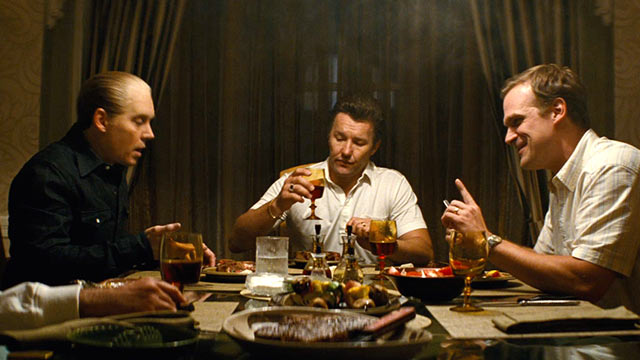Trey Edward Shults’ meditation on
paranoia “It Comes at Night” is a creeping thriller, about a family held
together by fear. Many filmmakers and
storytellers have mined numerous post-apocalyptic scenarios to further explore
the darkest corners of the human experience, and in that regard this picture
prides itself in starring deeply into the abyss without blinking.
The film centers on a small family
played by Joel Edgerton and Carmen Ejogo as the parents Paul and Sarah and
Kelvin Harrison Jr. as their 17 year old son Travis. Only a few days after
having to quarantine Sarah’s elderly father from the house, later killing him and burning his body in the
backwoods to insure that the deadly disease he contracted can’t be further
spread, a stranger from a few miles away named Will (Christopher Abbott) begs
the family for food and refuge for himself and wife and toddler. After arguing
with his hopeful wife and sternly vetting the newcomer, Paul decides to aid in
this rescue effort. Will and his young wife Kim (Riley Keough) are grateful for
the food and sanctuary but the specter of tribalism and tragedy looms large
over this stressful new dynamic.
Shults does a good job at
establishing the emotional stakes of this story early on so that when even the
smallest disturbances are breached, we are made as hyper cautious as our
worried protagonists. Like John Carpenter’s 1982 meditation on paranoia “The
Thing,” this film puts the characters in a position where common decency is not
the rational choice in close quarters. The overarching themes about stubborn
masculinity and loss of humanity in the face of panic are not new to this
socially conscious sci-fi sub-genre, but it’s the directorial precision and complicated
performances that set this film apart from the mountains of forgettable
virus/zombie movies that precede it.
Some have complained that the film’s
marketing campaign by distributor A24 has been misleading. The titl, as well as
the jumpy trailer that focuses more on the viscera and eerie imagery than it does the movie’s core family drama, have
lead some disappointed viewers to believe that this was supposed to be more
conventional horror film. While this experience is thoroughly entrenched in
bleak tragedy and the implications of the plot are fairly horrific, the movie
doesn’t ramp up every scene towards a jump scare and there aren’t any monsters
or cannibals scratching on the outside doors of the protagonists secluded home.
What that said, there is a strange omniscient point of view that hangs over the
drama as it unfolds and it sometimes feels like a demonic hex that’s been put upon
this sensitive circumstance.
“It Comes at Night” may not be the
traditional horror programmer that people thought they were getting but it is a
very dark film that’s meant to challenge our views on human empathy and familial
loyalties. Cinematographer Drew Daniels uses minimal lighting schemes to sculpt
his subjects out of ink-black darkness, and his slow push-ins on red doors and
elongated hallways recalls the nightmarish imagination of David Lynch and
monumental intimidation of Stanley Kubrick.
I can’t say that the sci-fi subject matter presented here is all
together new or innovative and as a thriller the movie’s reveals are somewhat
predicted, but the filmic craft exemplified and the actor’s dedication to their
character’s emotional motivations elevate the stock premise into being a taught
exercise in suspicion.
Grade: B+
Originally Published in the Idaho State Journal/Jun-2017
Originally Published in the Idaho State Journal/Jun-2017
Listen to this week's episode of Jabber and the Drone to hear more conversation about "It Comes At Night."




